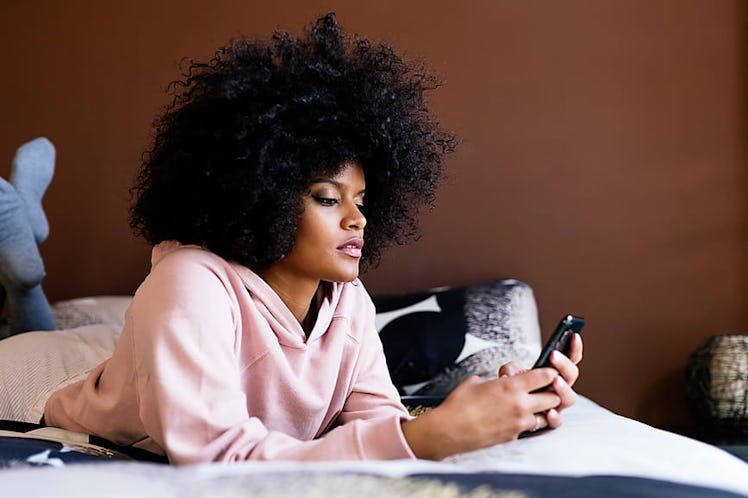
Science Says You Probably Need More Of This One Thing If You're Not Sleeping Well
Do you dream of coffee? Is the only driving force motivating you to leave your bed in the morning the piping hot Americano you pre-ordered on your way out the door so you could skip the line at Starbucks, and sip the zombie out of your system? Relying on caffeine to bring your body back to life is like a rite of passage when you’re waking up at the crack of dawn, but there’s a good chance the reason you’re tossing and turning in the first place is because dehydration affects your sleep. And if science has anything to say about your dependency, it’s that your body needs some good ol’ H2O with that venti soy latte. So if something like coffee, caffeinated tea, or even hot chocolate tends to be your first choice for a morning pick me up, you might want to consider splurging for a bottle of water to-go, too.
Trust me, I am in no position to shame you for giving your body only partially what it needs to revive itself in the a.m., because I, too, lean on herbal teas to start my day. A plain glass of water is more or less a lunchtime beverage as far as I’m concerned. Still, I’ve been trying to pour myself a cup of H2O with breakfast to double up on liquids, since I know for a fact I rarely, if ever, drink the recommended six to eight cups in a day. But aside from the fact that, per the Mayo Clinic, not drinking enough water could lead to some serious health issues, like extreme fatigue, dizziness, and less urination to naturally release toxins in the body, new research links dehydration to a lack of sleep, and, like water, sleep is definitely something you and I both need enough of to function properly.
According to ScienceDaily, a team of researchers from Penn State University and the National Natural Science Foundation of China took a closer look at how clocking in the bare minimum amount of shut-eye your body needs per night might affect your hydration levels. The study focused on a whopping 20,000 participants from the U.S. and China, who were split into three groups. As per the ScienceDaily press release, each participant was surveyed about their sleeping habits, and asked to submit a urine sample to reveal any traces of dehydration. According to the study's results, which have been published in the journal SLEEP, the official publication of the Sleep Research Society, those who slept an average of six hours every night were more likely to be dehydrated than those who slept eight hours.
But what exactly is happening inside your body during this six-hour span that can cause you to become dehydrated? And what could possibly be happening in those extra two hours of sleep that would make such a difference? According to Robert Glatter, M.D., an assistant professor of emergency medicine at Lenox Hill Hospital, Northwell Health, it all has to with your hormones.
"If you are not sleeping enough, you are missing out on the a.m. surge of vasopressin," aka a hormone produced by your brain that signals the kidneys to prevent dehydration by promoting water retention in your body, Glatter tells Elite Daily. In other words, the less you sleep, the less vasopressin is produced, which results in dehydration, because the kidneys basically weren't told how much water they need to conserve.
So here’s the silver lining in all of this: You don’t necessarily have to give up coffee, tea, or any other caffeinated beverage that curbs your fix in the morning. But you do have to compensate for your body’s water deficit if you want to ensure a good night's sleep. See, here’s the thing: it’s essentially a domino effect. When you don't sleep long enough, it can lead to dehydration, according to this new research. And on the flip side, dehydration can cause you to not sleep long enough, or at least not properly throughout the night, because of your body's demand to quench such an intense thirst.
In order to put a stop to this vicious cycle, Glatter suggests having a few cups of water before caffeine in the morning to ensure you're starting the day on the right (i.e. hydrated) foot. Additionally, Matt Garrell, a registered dietitian, certified personal trainer, and expert with The Vitamin Shoppe, tells Elite Daily that beverages with electrolytes are beneficial, too. "Electrolytes help with dehydration, muscle contractions, and fluid regulation,” he explains, so you might want to try switching traditional H2O for coconut water (which boasts lots of electrolytes) instead.
If plain liquids don't do it for you, and you're looking for a little more sustenance first thing in the morning, certified holistic health coach and co-founder of Raw Generation, Jessica Rosen, says raw fruit and vegetable juices are the way to go. "Water is always a great option to drink first thing in the morning, but when you’re highly dehydrated, it’s extra beneficial to drink something that provides minerals and electrolytes," she tells Elite Daily over email. "Just be sure that [the juices] do not contain added sugar and are unpasteurized. Pasteurized fruit juices are loaded with sugar which promotes dehydration."